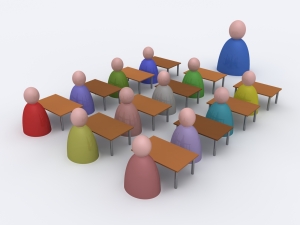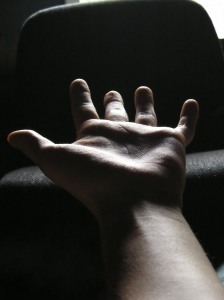
‘But everyone on Cbeebies is Christian!’ huffed my daughter on Christmas day; despite the fact she’s watched numerous clips about Holi, Diwali, and Purim and the like on their website. I followed up by explaining that once most people in the UK were Christian, and though many still follow Christian traditions, they don’t think of themselves as being any religion and so forth and also that there aren’t many Jews, so we can’t expect to see ourselves on TV a lot. Although ironically, overall in popular culture we are quite extraordinarily overrepresented.
I find it fascinating to ask non-Jews how many Jews they think there are in the UK. The usual reply is something like ‘I don’t know… a couple of million, perhaps?’
The actual answer is around 300,000.
I’m not sure if it would be better or worse for us if more people knew.
On the one hand, I fear that if people assume there’s millions of us, they might wonder why they don’t know any Jews and think we must be rather keeping ourselves to ourselves and what that’s about, and ‘Ooh, look at them swanning about saying they’re the Chosen People’. When in fact, it’s quite possible for people across large swathes of the UK to go through life not knowing anyone of the Hebraic persuasion, as we’re small in number and not distributed much beyond London and a few cities.
On the other, when you look at our numbers, well, it’s hardly bloody surprising people believe in a Jewish conspiracy. Culturally and economically, we punch ludicrously above our weight. We’re vastly outnumbered by just about every other widely recognised religious and cultural group in the UK, but you wouldn’t know it.
If it’s not a conspiracy, how do we do it? If it is, then where the hell is my cut?!
I’d say there’s no particular mystery to it. We’re basically a bunch of loudmouths who don’t take things lying down. And yes, I think we do have a bit of a neurotic work ethic and a lack of shyness about being smart (see self-confessed smart Jew Sander Gilman’s fantastic ‘Smart Jews’ for more on this). Also, as pointed out in a fascinating chapter of Malcolm Gladwell’s ‘Outliers’, our historical outsider status has meant that we’ve often been able to fill the gaps others could or would not – Gladwell takes the example of corporate acquisition law in the US, which the WASP law firms who wouldn’t employ Jews also wouldn’t touch, as it was considered ungentlemanly. So the down-at-heel Jewish firms took it on and hit the jackpot in the late 20th century. Similar applies to banking, which the Jews undertook because Christians snubbed ‘usury’ and forbade Jews from participating in many other trades. And of course then spent centuries going on about how Jews were obsessed with money, having forced them to be collectively heavily involved with it. Also entertainment, a field which just wasn’t seen as terribly Christian and where the Jews took their chances, remaining heavily entrenched to this day. Given the plug for Gilman and Gladwell, I’d be doing my father wrong if I didn’t here recommend his ‘Jewry in Music’ on this last topic. There you go, Dad.
Then there’s the whole ‘role model’ thing. Historically, I was sceptical that having ‘role models’ made much difference to anyone, but as time has gone on I think Jews are the proof that it does. I grew up frequently having it pointed out to me that such-and-such a composer/philosopher/politician/business mogul/author/musician etc was Jewish. Something that presumably most non-Jews neither know nor care about, which is pretty much as it should be. And I think that after a while it does have some sort of effect. Feeling that you are part of the same group as a variety of talented and/or influential people understandably might make one more confident in one’s own abilities. It works for public schoolboys and I suppose it works for us.
Famously, we talk a lot and frankly a dinner table conversation often takes on the quality of public speaking in many Jewish households. Not to mention bar/bat mitzvahs, where you basically have to give a very public presentation at possibly the most self-conscious period of your life (thanks for that one, tradition). The inheritance of Talmudic debate has filtered down into basically being a bunch of argumentative and pedantic loudmouths, though personally I loathe arguing about anything, but I will blame my English grandmother’s genes for that.
If we are ‘successful’ collectively, which honestly I don’t know if I can say we are, I think there are some traceable threads behind it.
Another thing I don’t really know is what even a Jew even is to most non-Jews. The pork-avoiding, kippah wearing synagogue attender of RE lessons? In my experience they are equally likely to be a seafood loving synagogue avoider who nonetheless has barely any non-Jewish friends. Perhaps to some we are a historic relic, revealed through sources such as Simon Schama’s recent ‘The Story of the Jews’. Or even, in today’s victim-loving culture the faceless martyrs of the Holocaust.
The reality is most Jews exist somewhere on two parallel scales of the social and religious, as, I suppose do most people with a religious affiliation. And I do say ‘people with a religious affiliation’ rather than ‘religious people’. You can be, as I suggested above, utterly unobservant, yet have an entirely Jewish social life. You can, like us, be somewhere in the middle of both, with some observance and some Jewish friends. Or 100% socially and religiously Jewish.
It’s hard for me to tell how we are seen from the outside. I think for large swathes of the UK population we’re pretty much mysterious, and understandably so given our small numbers. I’ve heard stories of well-educated types like doctors asking ‘So do you worship in a church, or what?’ And then there’s the question of what a ‘religious person’ is. I am Jewish. I attend synagogue. My daughter goes to a Jewish school. But I wouldn’t say I was a ‘religious person’, that class so frequently scoffed at by the sort of atheist who insists on being smug about it.
In my milieu I seem to be surrounded by a lot of people who either grew up without any religious trappings or in surroundings quite hostile to religion of any sort, plus a few who had the misfortune to grow up in the grip of dogma that they have since escaped. To these people, describing my relationship with Judaism (I can’t call it my ‘faith’) can make me feel like the proverbial sighted individual attempting to describe colour to the proverbial visually challenged one. Friends are frequently mystified how my husband and I, two seemingly rational people, can actually attend synagogue on a relatively frequent basis, especially when we add that we don’t believe in God.
I actually don’t believe that it’s that complicated or hard to understand – synagogue is for us a cultural tradition, a social event and yes, a spiritual occasion, God or no. There is a shared experience there and what I see as a privilege of carrying on three millennia of what is essentially good stuff, if you ignore the weird bits, like giving your wife a potion that will make her thigh fall off if she’s been unfaithful.
People sometimes take a very hard line on children and religion – shouldn’t we wait until our kids are old enough to ‘decide for themselves’? To which the answer is yes, they will decide for themselves when they’re older and we leave it to them whether they choose to participate, identify or having nothing to do with the whole shebang.
In the meantime they’re being brought up as Jews (when our daughter was a few weeks old, my husband pointed to her and said ‘She’s a Jew – that’s so weird!’).The fact is, we can’t not bring them up as Jews, even if we never went to synagogue; there’d still be Friday nights and smoked salmon and saying ‘You know her on the telly, she’s Jewish’. As a child people generally acted around me as though God were real, although never attempted to suggest that the Old Testament was How It All Happened, and the fact is I came to my own realisation without feeling I’d been somehow lied to or betrayed. In fact, on the lied to and betrayed scale, it’s considerably less brutal and upsetting than the non-existence of Santa Claus, I suspect.
Our daughter doesn’t attends a Jewish school because we wanted that of it itself, but because it was near, it was good and we’d know some of the parents, which is important as I’m rubbish at making new friends, although I have to add I haven’t especially had Jewish friends until recently. My husband often feels uneasy when our daughter comes home telling us about an Old Testament story, or singing songs about Hashem but I keep reminding him that she will come to her own conclusions anyhow. We already talk about religious stories in terms of ‘Some people believe…’ or ‘The stories in the Torah say…’ rather than attaching a weight of truth of any of it.
So, yes, our kids are Jews, for better or worse – for me, I’m pretty glad I’m Jewish. My mother-in-law has interestingly described moving from finding acts of observance a burden to finding them a privilege to carry out and I think that kind of sums up my attitude to being Jewish, which ties in with the whole ‘Chosen People’ thing. I don’t think I’m any better than anyone else because I’m Jewish, and our role as the Chosen People is supposed to be about setting an example to the other nations (hollow laugh) rather than believing we’re superior and everyone else sucks because Hashem is not so big on them as he is on us. But it is kind of amazing and rather cool to be carrying on what my husband calls a ‘Three-thousand-year-old Middle Eastern beardy desert cult’ in twenty first century London, with the joys and the difficulties that entails.








